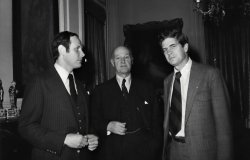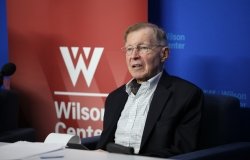Book Discussion: "American Dreamers: How the Left Changed a Nation"
Join us for a book discussion of Michael Kazin's new book, which provides a "panoramic yet intimate portrait of the American left."
Overview
The conventional view of the American left has been a story of movements that failed to gain support from mainstream America. In American Dreamers: How the Left Changed a Nation, author Michael Kazin argues that although these movements may not have succeeded on their own terms, many nonetheless made lasting contributions to American society. Looking at our nation’s history through the lens of its reformers, radicals, and idealists, Kazin’s book offers a panoramic yet detailed portrait of the American left. On October 12, 1011 American DreamersKazin, who is a professor of history at Georgetown University, and commentators Eric Arnesen (professor of history, George Washington University and current Wilson Center fellow) and Cynthia Harrison (associate professor of history, Women's Studies, and Public Policy, George Washington University) offered their perspectives on this provocative subject.
Kazin began with a general definition of the left: “[Leftists] demanded that the promise of individual’s rights be realized in everyday life and encouraged suspicion of the words and power of all manner of authorities.” Historically, he argued, what the left lacked in political fortitude was made up for by its cultural influence. Pointing to the example of the Great Depression and the 1930s, he suggested that Franklin D. Roosevelt wasperhaps the only truly leftist president the United States has seen. Yet while FDR’s successes remain unique, the leftist culture of the 1930s captivated Americans’ imagination at the time and remain fixtures of the country’s cultural life. TheGrapes of Wrath and Mr. Smith Goes to Washington, both written by American Communists, became widely accepted by the American public at a time when the Communist Party of United States was unable to rally support from many of its political allies. In Kazin’s view, this situation underscores an often-heard critique of leftists as being inept politicians while maintaining a high level of cultural relevancy.
Eric Arnesen remarked that Kazin’s portrayal of American leftists was both fair and un-romantic. He contended,, however, that the American Communist Party was not as egalitarian as Kazin suggests. Cynthia Harrison commended both Kazin’s book and the left more generally for emphasizing legal equality and removing the stigma attached to commonly disadvantaged groups, especially women. Still, she said, many inequities—of race and class as well as gender—remain in American life, and she cautioned against exaggerating what the left has accomplished.
In response to the commentary, Kazin conceded that the left’s biggest weakness has been garnering enough power to sway political thought. Today’s leftists are struggling to find a place in the political arena. Propelled by the civil rights and gay rights movements as well as second -wave feminism, the New Left gained notoriety in the 1960s by attempting to build a viable political competitor to the entrenched two-party system in the United States. According to Kazin, their best attempt at political mainstreaming came with the Citizens Party, founded by Barry Commoner in 1979, yet even in the leftist hot spot of Berkeley, California, this organization failed to get off the ground.
Reflecting on the current political situation, Kazin said that it was too soon to tell if the Occupy Wall Street movement will be as effective as the labor strikes of 1934. But, he pointed out ,all great left movements since the 1930s have made economic inequality their central issue. While in the final chapter of American Dreamers, he refers to today’s activists as “rebels without a movement,” Kazin held out hope that the Occupy Wall Street movement, drawing on the left’s long tradition of cultural strength, could progressinto a national cause.
Speaker

Thank you for your interest in this event. Please send any feedback or questions to our Events staff.











